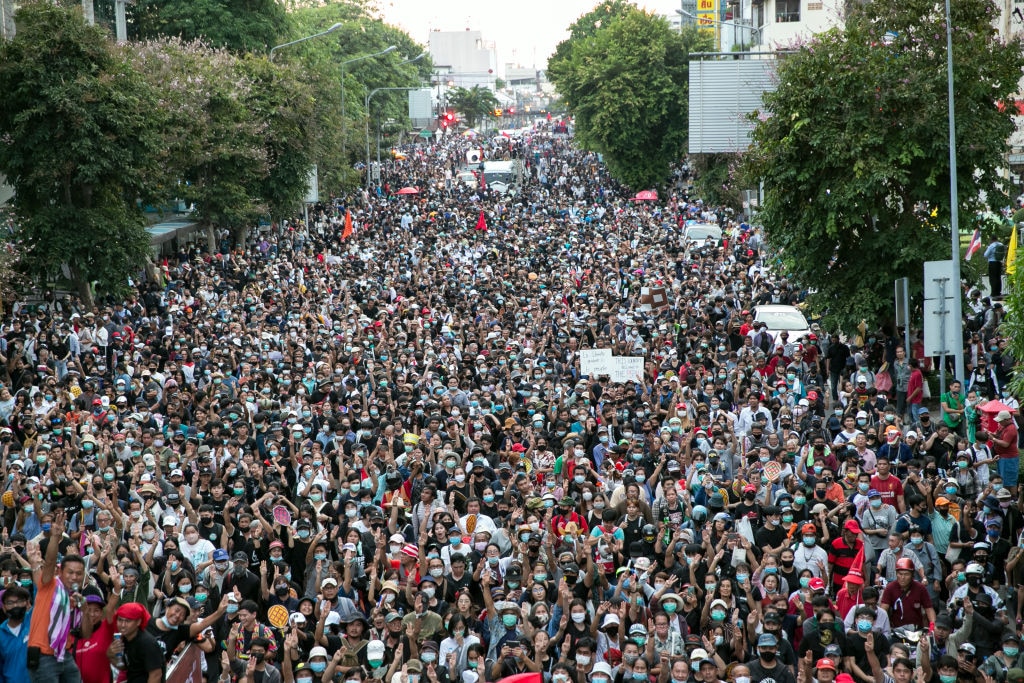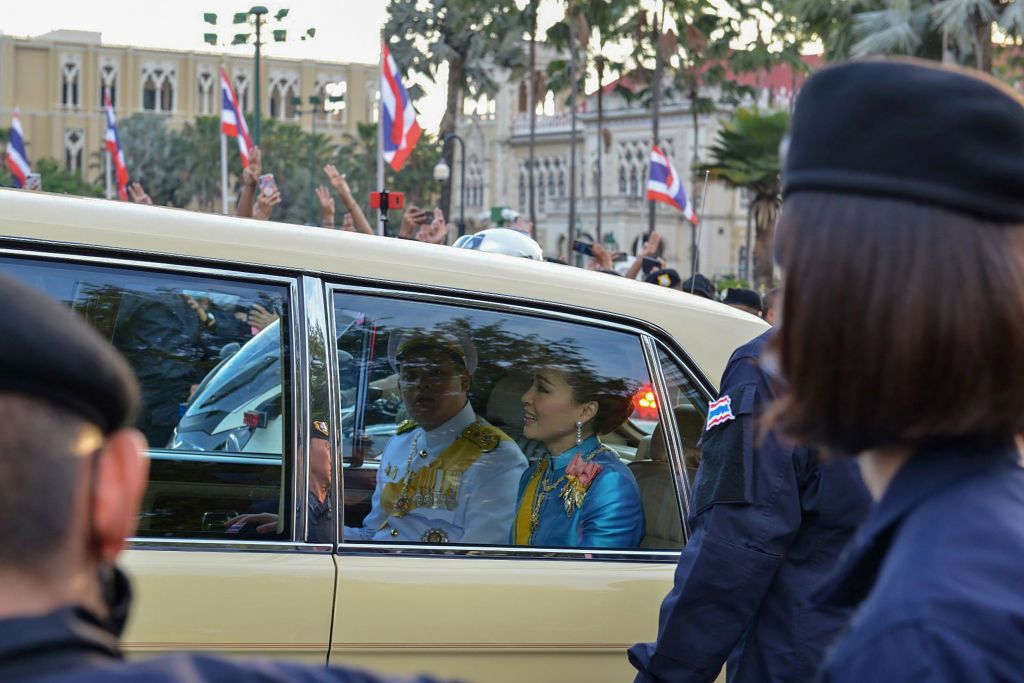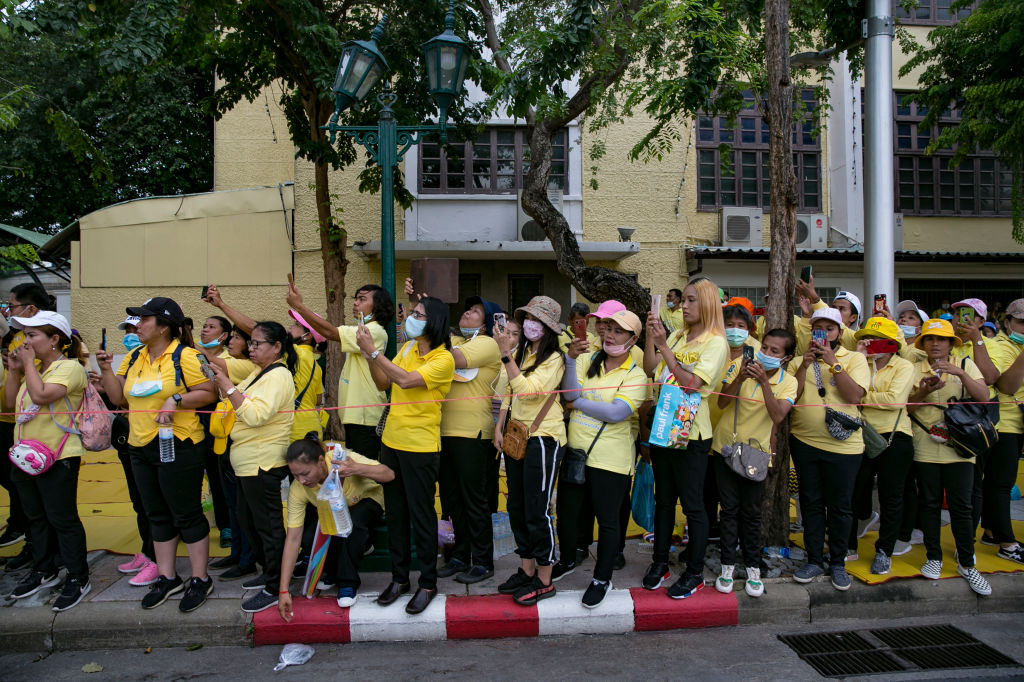Thailand moves to quell pro-democracy protests with bans on gatherings and news that ‘could create fear’

Thousands of Thai protesters demanding the prime minister’s resignation have rallied outside his office in Bangkok after scuffling with royalists opposed to the youth-led movement’s calls for reforms to the monarchy.
Thailand’s government has banned gatherings of five or more people and the publication of news or online messages that could harm national security under an emergency decree to end Bangkok street protests.
Thai authorities have also arrested two leaders of anti-government protests, Arnon Nampa and Panupong Jadnok, the Thai Lawyers for Human Rights group said.
“Authorities arrested Arnon and Panupong at 5 a.m.,” the rights group said, adding that Mr Arnon was arrested over a speech he had given in the northern city of Chiang Mai. It said the reason for Mr Panupong’s arrest was not clear.
Protests have escalated for three months and protesters set up camp outside Prime Minister Prayuth Chan-ocha’s offices to demand his resignation late on Wednesday.
The government said it also acted after demonstrators obstructed a royal motorcade.
“It is extremely necessary to introduce an urgent measure to end this situation effectively and promptly to maintain peace and order,” state television announced.
It was accompanied by a document setting out measures that took effect from 4am local time to ban big gatherings and allowing authorities to ban people from entering any area they designation.
It also prohibits: “publication of news, other media, and electronic information that contains messages that could create fear or intentionally distort information, creating misunderstanding that will affect national security or peace and order.”
Tens of thousands of protesters marched in Bangkok on Wednesday.
The protest movement aims to remove Mr Prayuth, who took power in a 2014 coup that was meant to end a decade of violence between supporters and opponents of the country’s establishment.
Those marching on the streets also want a new constitution and have called for a reduction in the powers of King Maha Vajiralongkorn – breaking a longstanding taboo on criticising the monarchy.
Protesters shouted at the king’s motorcade in Bangkok on Tuesday after the arrest of 21 protesters.
The king, who spends most of his time overseas but has returned from Germany for several weeks, travelled in a car alongside Queen Suthida through a crowd of peaceful protesters on Wednesday.
Some protesters gave the three-finger salute – a gesture of defiance the pro-democracy movement has borrowed from the popular “Hunger Games” films – and chanted “get out” at police protecting the vehicle.
Such overt challenges to the monarchy are unprecedented in Thailand, where the royal family’s influence permeates every aspect of society.
The youth-led movement’s calls for reforms to the monarchy have prompted a backlash from Thailand’s staunchly pro-royalist establishment.
“The monarchy has been around more than 700 years,” said Sirilak Kasemsawat, one of thousands of royal supporters waiting “to show we love the king”.
Government spokesman Anucha Burapachaisri announced late Wednesday the premier had ordered police to press charges against “the protesters who obstructed the royal motorcade”.
Charges will also be pursued against “those who had acted in a way that defames the monarchy,” he said in a statement.
“They must face legal procedures without exception.”
Several popular anti-government movements have arisen in the turbulent modern history of Thailand, which has endured long bouts of political unrest and more than a dozen successful military coups since 1932.
The army has long positioned itself as the sole defender of the ultra-wealthy king, whose power stretches across every facet of Thai society.
Activists have repeatedly said they wish only for the monarchy to adapt to modern times.
Their demands include the abolition of a strict royal defamation law – which shields the king from criticism – and for the monarch to stay out of politics.
“We’re just asking them to change with us,” protester Dear Thatcha told AFP.













